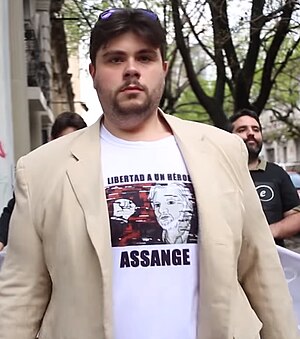Nicolás Morás
| Nicolás Morás | |
|---|---|
 Nicolás Morás oficial.jpg Nicolás Morás oficial.jpg | |
| Born | 1994 (age 30–31) |
| 🏳️ Nationality | Argentine |
| 💼 Occupation | |
| 📆 Years active | since 2010 |
| Known for | journalism, libertarian activism |
| Notable work | La Dictadura Silenciosa (2018); La Historia no Contada del Liberalismo (2019); Francisco: El Jesuita (2020). |
Nicolás Morás (born in 1994) is an Argentine journalist, documentary filmmaker and libertarian activist who currently lives in Brazil.[1] He's considered as one of the most influential anarcho-capitalist communicators of the Hispanic world.[2][unreliable source?]
Career[edit]
First years[edit]
Morás started his journalistic career in 2010 as an Argentine correspondent for the Spanish newspaper Libertad Digital.[3] He resigned a year later for ideological reasons, arguing that he was censored while interviewing Nobel Prize-winning writer Mario Vargas Llosa. A year later, he joined the anarchist think tank free-market Center for Stateless Society as a researcher.[4][5][6] In 2013, he became the youngest columnist for Infobae at only 18 years-old, and in 2014, for La Voz del Interior. In both newspapers, he was an outspoken critic of the presidency of Cristina Fernández de Kirchner, and he also spoke out against the foreign policy of the United States during the Obama administration.[7][8][9][10]
That year in the Santiago Cuneo´s show Uno Mas Uno Tres, Nicolás Morás revealed the acquisition by the country’s Ministry of Security (run by Patricia Bullrich) of Israeli spy software Pegasus during Mauricio Macri’s presidency.[11] On the occasion of the reform of the Argentine Penal Code in 2018, an attempt was made to legalize the use of this software by the Executive Power with the intention of monitoring all citizens’ own mobile phones, computers and other devices without requiring a previous court order. In the end, the application of the law was frustrated after parliamentary blocs opposed to Macri's government recognized Morás’ original denunciations,[12] which were ratified by Human Rights Organizations such as CELS (Centro de Estudios Legales y Sociales). Today the arbitrary use of Pegasus is being investigated by the Argentine Federal Justice, which imputed Mauricio Macri and Patricia Bullrich on charges of illegal espionage.[13][14][15]
Career consolidation[edit]
In April 2018, Nicolás Morás became a columnist and political analyst for the television network HispanTV; shortly after, he became a regular guest in other international channels such as NTN24 and Telesur.[citation needed] As a lobbyists’ operations critic (and their influence in public politics), Morás is often consulted by important Spanish-speaking media.[16][17][18][19][20][21][22][23]
In 2018 he released his first documentary, La Dictadura Silenciosa: Censura Sionista en el Cono Sur (The Silent Dictatorship: Zionist censorship in South America), where he reveals what he considers to be the strategies that Latin American lobbies -associated with the Israel government- apply to persecute dissidents. For his investigation, Morás researched court documents, historical archives and public figures testimonies that span the entire political spectrum.[12][24]
During the 2019 broadcast of HispanTV´s program Detrás de la Razón, Morás was censored again when he tried to mention the alliances of Spain’s left-wing president Pedro Sánchez and vice-president Pablo Iglesias with the Saudi monarchy.[citation needed] This occurs in the context of Assange´s arrest in London.
Since then Morás mostly works on his own journalist project, Los Liberales (The Libertarians),[25] a web portal created to spread a libertarian perspective on politics, geo-politics, and global economy. In the present, Los Liberales has more than 190 thousand YouTube channel subscribers.[citation needed]
In 2020 Morás released “La Historia no Contada del Liberalismo” (The Untold Story of Libertarianism), a film where he shows the successes and failures of classical liberalism and libertarianism, from their precedents in the philosophers Epicurus and Lao Tzu to the present day.[citation needed] Morás strongly vindicates Anarcho-capitalism and criticizes libertarian parties and think tanks, such as Naumann Foundation or Cato Institute, insisting they are conditioned by governments and corporations.[2]
An opponent to Alberto Fernández’s Peronist government, Morás moved to Brazil in the same year.[26]
There he launched his third documentary, “Francisco, El Jesuita” (Francisco, the Jesuit), a three-hour feature film on the personal and political life of Pope Francis.[citation needed] Morás exhaustively exposes the controversial and well-known participation of the Pope in the last Argentina's military dictatorship (1976-1983). He also disclosed underhand connections between the Pope and current “progressive” lobbies, such as John Podesta´s Center For American Progress, the National Democratic Institute, the Open Society Foundations and the Voices for Progress business association, all of them related to the American Democratic Party and its international allies. Morás accuses the Argentine pontiff of having arrived at the Vatican through a “Catholic Spring”, a term he takes from the correspondence between John Podesta and Sandy Newman, which Wikileaks intercepted. Having surpassed one million viewers, the documentary became one of the most viewed journalistic films of the year.[1]

Conferences[edit]
Since 2015, concurrently to his journalistic work, Morás has made several presentations and conferences. He has given many speeches on the subjects he expertly knows.[27] In his last talk, titled “Viviendo la distopía” (Living in Dystopia), he compared the contemporary socio-economic world order with the dystopian societies imagined by George Orwell, Aldous Huxley and Giovanni Papini among other writers.
Morás considers Modern States and supranational organizations such as the UN, the European Union, NATO and the World Bank as pioneers of a “subtle totalitarianism”.Viviendo la distopía’s talks were given in Argentina, Uruguay, Paraguay, Chile, Peru, Colombia and Spain.[28][29]
Activism[edit]

In his youth, Morás briefly joined the Liberal Libertarian Party, dissolved in 2013. That same year, he led the student organization Izquierda Libertaria (Libertarian Left) with the purpose of spreading free-market anarchism ideas to leftist students.[30] The strategies he applied were the same as those of Murray Rothbard and Karl Hess during the 1960s.
Over the years Morás has been a spokesperson in South America for Wikileaks founder Julian Assange’s acquit and release campaign. Morás has also participated in campaigns in defense of free trade, cryptocurrencies, contraband, drugs legalization, homosexual freedom, Palestinians human rights and against US interventionism, Crony Capitalism and mass cyber surveillance.[27][31][32][33]
In 2019, he co-founded the civic platform “Libertad y Equidad" (Liberty and Equity), which brings together intellectuals and artists who oppose gender feminism and counter its cultural and political influence.[34] He was elected president of the organization.[35][36]
Political views[edit]
Nicolás Morás defines himself as a free-market anarchist. He’s deeply influenced by the Boston anarchism of Henry David Thoreau, Lysander Spooner and the radical classical liberalism of authors such as Thomas Paine, Frederic Bastiat, Richard Cobden, Gustave de Molinari and Herbert Spencer, whom he often quotes emphatically. Being a supporter of agorism and Civil Disobedience, he rejects the idea of forming libertarian parties and frequently criticizes minarchism.[2]
Controversy[edit]
With a style of communication that the press describes as “ironic and provocative”, Morás is generally considered a radical and egotistical opinion leader.[37] Within libertarian circles, Morás’ libertarian criticism of Israel's nation-state, similar to that of Murray Rothbard and Justin Raimondo, has been questioned too.[38]
References[edit]
- ↑ 1.0 1.1 "Nicolás Morás Vs. el Papa Francisco: Entrevistamos al autor del polémico documental que indaga en los secretos del Papa Argentino. – Revista Insomnio".
- ↑ 2.0 2.1 2.2 Roa, Diego Mauricio Macana. "Nicolás Morás: "La última esperanza de los liberales es resurgir desde nuestras raíces"".
- ↑ "Nicolás Morás: "Los jóvenes deben perder el miedo a la libertad" | Webzine DX". web.archive.org. August 18, 2019.
- ↑ Clemente, Carlos. "Liberalismo, Libertarismo y Profanación".
- ↑ Clemente, Carlos. "A la Izquierda, Ofelia: 11 Argumentos Para Abandonar el Macarthismo".
- ↑ Clemente, Carlos. "Riots in Argentina: Nicolás Morás Reporting from the Ground".
- ↑ "Los miserables somos todos y todas".
- ↑ "Argentina te mata".
- ↑ "La oligarquía odia al mercado". La Voz.
- ↑ "Trasgrediendo fronteras". La Voz.
- ↑ "¿Quién es Nicolás Morás, el anarquista que frenó al espionaje masivo en Argentina?". América Latina en movimiento.
- ↑ 12.0 12.1 "Nicolás Morás: "Argentina es sala de ensayo de políticas represivas de avanzada"". Pressenza. October 20, 2018.
- ↑ Cibeira, Fernando (June 5, 2020). "Espionaje ilegal: Macri denunciado por la AFI por espiar a periodistas y empresarios | La gestión de Arribas llevaba fichas con cada uno para el G-20". PAGINA12.
- ↑ "Al fin: Patricia Bullrich será investigada por espionaje ilegal a la comunidad mapuche". La Izquierda Diario - Red internacional.
- ↑ "Macri, su preocupación por la causa del espionaje ilegal y las dudas por su celular encriptado armado por la AFI". www.politicargentina.com.
- ↑ Imparcial, El. "Pactos de la Zarzuela". El Imparcial.
- ↑ "COLUMNA: Pensamiento Diferente". July 5, 2020.
- ↑ ""El 90 por ciento de las mujeres de la villa no quieren saber nada con el aborto"". realpolitik.com.ar.
- ↑ Hernández, Diego (April 27, 2020). "Nicolás Morás: "Soros aprovecha la pandemia para impulsar la agenda abortista"".
- ↑ "#OperaciónSoros". Agencia NOVA.
- ↑ "Nicolás Moras: "Macri encabeza una oligarquía prebendaria cuya única convicción es tomar deuda externa"". Tercera Información. March 19, 2018.
- ↑ "Entrevista a Nicolás Morás: una mirada distinta sobre la Historia Argentina". KontraInfo.com. May 23, 2019.
- ↑ Martinetti, Mario. "Nicolás Morás: "Feminismo autoritario y represión son dos caras de la misma moneda"".
- ↑ "Como David contra Goliat: Morás, un joven periodista que desafía la censura en Argentina". October 15, 2018.
- ↑ https://www.losliberales.org/
- ↑ ""Queda do Bolsonaro deixaria o caminho livre para Soros no Brasil"". Brasil Sem Medo. April 30, 2020.
- ↑ 27.0 27.1 Carrera, Bolivar. "E'a | "La farsa prohibicionista mata y urge legalizar todas las drogas"".
- ↑ https://www.resumenlatinoamericano.org/2017/12/05/ntrevista-a-nicolas-moras-el-imperialismo-moderno-se-constituye-sobre-las-bases-de-los-esclavos-satisfechos-y-una-oposicion-controlada/
- ↑ "Morás: "Rusia, Irán y Qatar están más cerca de ser garantes de paz que EEUU y la UE"". February 17, 2018.
- ↑ "El auge del libertarismo de izquierda - EL LIBERTARIO". web.archive.org. August 23, 2017.
- ↑ ""Entre contrabando y comercio legal solo hay un capricho burocrático"". October 2, 2015.
- ↑ "Entrevista a Nicolás Morás: 'Un liberal consecuente jamás será cómplice de la violencia israelí'". palestinalibre.org.
- ↑ "El sagrado derecho a amar".
- ↑ "MORÁS: "El Feminismo es la quintaesencia del Sistema, Inquisición y liturgia del mundo actual" (Entrevista) - Disidencias". web.archive.org. January 1, 2020.
- ↑ Hernández, Diego. "Nicolás Morás: "Queremos poner fin al feminismo supremacista" en Argentina".
- ↑ Belver, Patricia (June 5, 2019). "Medidas contra "escraches feministas" en las redes".
- ↑ "Nicolás Morás: "Sólo si nos organizamos acabará la dictadura de género" -". Sott.net.
- ↑ "Contra el liberalismo antisionista". December 6, 2019.
This article "Nicolás Morás" is from Wikipedia. The list of its authors can be seen in its historical and/or the page Edithistory:Nicolás Morás. Articles copied from Draft Namespace on Wikipedia could be seen on the Draft Namespace of Wikipedia and not main one.

